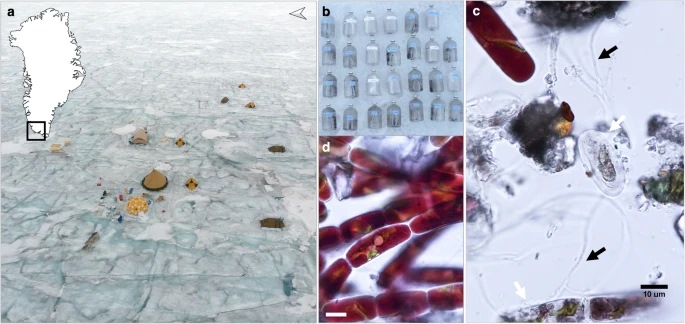Ice serves as a natural shield for both the Earth and its oceans. Its bright, reflective surface helps bounce excess heat back into space, playing a crucial role in regulating the planet’s temperature. This process is particularly evident in the Arctic, where ice ensures that more sunlight is reflected rather than absorbed, keeping the region significantly cooler than the equator.
Why has the glacier been melting?
Since the early 20th century, glaciers across the globe have been shrinking at an alarming rate. The primary driver of this melting is human activity, particularly the surge in greenhouse gas emissions since the Industrial Revolution. As carbon dioxide and other pollutants accumulate in the atmosphere, they trap heat, leading to rising global temperatures. This effect is even more pronounced in polar regions, causing glaciers to break apart, flow into the ocean, and retreat further inland.
A new study uncovered algae's role in melting Greenland ice
A groundbreaking study has revealed that, in addition to these activities, algae also play a crucial role in the melting of the Greenland Ice Sheet. These microorganisms not only darken the ice, reducing its reflectivity, but also store nutrients, allowing them to spread across vast ice-covered regions. This discovery suggests that algae-driven ice melt may be more significant than previously thought.

Source:nature.com
What are the aspects of the researcher in this study of melting Greenland ice?
Greenland ice was melting due to various activities like human activity, greenhouse emissions, and many more, but recent studies have found the role of algae also in melting Greenland ice. Here in the table, all aspects are given in detail:
| Aspect | Findings |
| Role of Algae | Algae bloom on ice surfaces during warmer months, darkening the ice and accelerating melting. |
| Nutrient Storage | Algae can absorb and store nutrients, allowing them to colonise previously inhospitable areas. |
| Impact of Climate Change | Rising temperatures lead to earlier ice melting, providing more opportunities for algae expansion. |
| New Discovery | Algae can survive with minimal nutrients, a factor that was previously underestimated. |
Algae and Ice Melt: A Growing Concern
- Algae blooms occur annually: As spring arrives and ice melts, algae thrive and spread, forming dark patches that absorb more sunlight and intensify melting.
- Earlier spring = More algae growth: Due to climate change, spring is arriving earlier each year, allowing algae to colonise increasingly larger regions.
- Algae contain dark pigments: These pigments reduce the ice’s ability to reflect sunlight (albedo effect), accelerating ice loss.
- Nutrient scarcity was once a limiting factor: Scientists previously believed algae needed external nutrients to thrive, but new research reveals their ability to store nutrients for future use.
Breakthrough Study: Algae's Nutrient Storage Ability
A research team led by Dr. Laura Halbach from Aarhus University, now a postdoctoral fellow at the Max Planck Institute, conducted an in-depth study of ice algae using advanced methods. Key revelations from their research include:
- Algae can survive on extremely limited nutrients.
- They efficiently store phosphorus, a crucial element for their metabolic functions.
- This storage capability enables them to expand into areas previously thought uninhabitable.
Dr. Halbach’s pioneering work involved measuring the metabolic activity of individual algae cells for the first time. By using isotopic tracing techniques and high-precision mass spectrometry, researchers were able to identify nutrient absorption patterns at a microscopic level.
A Thriving Ecosystem on Ice
The Greenland Ice Sheet, once considered a barren frozen desert, is now recognised as a hub of microbial activity. Scientists have discovered an entire ecosystem on the ice, including:
- Bacteria
- Fungi
- Viruses
- Snow algae and other microorganisms
This microbial diversity makes it challenging to study ice algae in isolation. Dr. Halbach's innovative research technique allowed her to track nutrient consumption at the individual cell level, separating algae activity from other organisms.
Scientific Approach and Experimental Techniques
- Isotopic Tracing: Researchers introduced nutrient markers to the ice ecosystem, allowing them to track nutrient uptake.
- SIMS (Secondary Ion Mass Spectrometry): This highly precise technique enabled the identification of nutrient consumption at the single-cell level.
- Findings: Algae exhibited high efficiency in absorbing scarce nutrients and maintaining reserves for future use.
Implications for Climate Change Models
This research has major implications for understanding climate change and refining global climate models:
- Algae-driven melting is underestimated: Current models do not fully account for the role of microbial activity in ice loss.
- More realistic predictions: Integrating microbial influence into climate models will enhance predictions of ice sheet behaviour.
- Wider impact on sea-level rise: Faster ice melt contributes to rising sea levels, affecting coastal communities worldwide.
Future Outlook: A Race Against Time
- Greenland's ice is increasingly exposed. As snow cover diminishes earlier each year, more ice surfaces become vulnerable to algae colonisation.
- Expanding algae populations: With the ability to store phosphorus, algae can continue spreading and accelerating melting rates.
- Urgent need for updated climate models: Understanding microbial contributions to ice melt is crucial for refining global climate projections.
Conclusion
This research sheds new light on how microscopic life forms significantly impact large-scale environmental processes. As algae continue to colonise and darken the Greenland Ice Sheet, the acceleration of ice melt becomes a pressing concern. Integrating these findings into climate models will be essential for more accurately predicting future changes in global sea levels and climate patterns.
Reference
"Single-cell imaging reveals efficient nutrient uptake and growth of microalgae darkening the Greenland Ice Sheet," published in Nature. com. This research was funded by the European Research Council (ERC) under the Horizon 2020 program as part of the DeepPurple project. It also received support from the Aarhus University Research Foundation, the Max Planck Society, the Helmholtz Recruiting Initiative, and the Agence Nationale de la Recherche.
Comments
All Comments (0)
Join the conversation